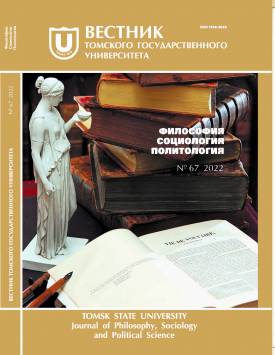Citizen in the streams of digitalization: Collisions of politics and culture
Modern flows of digitalization in various spheres of life form new configurations of social and business ties between the state and society. In fact, the current level of digital communications initiates a new chronopolitical cycle of global development. However, its specific forms depend on the strategies of the ruling political regimes, within which these processes not only generate new structures and mechanisms of power and public administration, but also resonate in the sphere of culture, in mental constructs and living standards of citizens. In the context of various strategies of the ruling regimes that focus on distancing citizens from the decision-making process, on communication with business or on strengthening national identification models, versions of the cultural evolution of civil society are also significantly modified. Responses and developments in the cultural body of the state and civil society are conditioned by various trends in the use of digital technologies. In turn, the actual political trend of digitalization mainly supports the authorities’ desire to take control of those forms of challenging their positions that can provoke a crisis of legitimization, shake the stability of their dominant position. In hybrid regimes and countries of unintended authoritarianism, digital technologies are used to strengthen political and administrative control over citizens’ sociopolitical activity and territorial movements, their discursive practices and deliberative arenas. Such forms of reproduction of the main information and political mechanisms of government, as well as the strengthening of control functions in the public sphere and mass discourse, not only preserve the fragmented nature of subcultural communications, but also support the spread of paternalistic and conformist attitudes in society, create advantages for traditionalist and paternalistic values. In Russia, the digitalization of politics preserves the old fractures in the domestic cultural body, maintaining the standards of confrontational discourse and hindering the enrichment of the value experience of a Russian citizen. Preservation of the established political realities in the medium term retains risks for maintaining constructive communications between the state and society, hinders free forms of enrichment and development of civic culture, and the spread of ideals and values of democracy. The author declares no conflicts of interests.
Keywords
political power,
ruling regime,
public administration,
digitalization,
citizen,
civil society,
political cultureAuthors
| Solovyev Aleksandr I. | Lomonosov Moscow State University | solovyev@spa.msu.ru |
Всего: 1
References
Сморгунов Л.В. Три стратегии политики цифровизации: государственное управление и трансформационный потенциал цифровых технологий // Мозаичное поле мировой и российской публичной политики. Политическая наука: Ежегодник 2020-2021 / Российская Ассоциация политической науки ; под ред. О.В. Гаман-Голутвиной, А.И. Соловьева, А.И. Щербинина, Москва ; Томск : Изд-во Том. гос. ун-та, 2021. С. 9-33.
Основы теории и практики интегрированных коммуникаций и медийной политики в «новой реальности» / под ред. П.В. Меньшикова. М. : МГИМО, 2022. 462 с.
Стратегические коммуникации в цифровую эпоху. Новые технологии / под ред. Л.С. Сальниковой. М. : Научная библиотека, 2019. 298 с.
О ’Reilly T. What’s the Future and Why It’s up to Us. London: Penguin Random House, 2017. 422 р.
Сморгунов Л.В. Политическая онтология цифровизации // Политическое в условиях цифровых трансформаций : материалы Всерос. науч. конф., Санкт-Петербург, 24-25 октября 2021г. / под ред. А. Курочкина, Л. Сморгунова, О. Игнатьевой. М. : Аспект Пресс, 2022. С. 10-17.
Кондратенко К.С. Институциональная рекурсивность публичных социотехнических систем // Демократия и управление: Информационный бюллетень «Политическая онтология цифровизации: исследование институциональных оснований цифровых форматов государственной управляемости». 2021. № 1. С. 13-17.
Косоруков А.А. Цифровое государственное управление. М.: Макс Пресс, 2020. 281 с.
Digital 2022.Russian Federation // We Are Social URL: https://disk.yandex.ru/i/HFmsAxsAsb2qSg. (дата обращения: 14.03.2022)
Fishkin J.S. When the people speak: Deliberative democracy and public consultation New York: Oxford University Press, 2009. 256 р.
Володенков С.В. Интернет-коммуникации в глобальном пространстве современного политического управления: навстречу цифровому обществу. М. : Проспект, 2021. 413 с.
Moe W.W., Schweidel D.A. Social Media Intelligence. New York : Cambridge University Press, 2013. 200 p.
Кто владеет СМИ в России: ведущие холдинги // BBC. 2014. URL: https://www.bbc.com/russian/russia/2014/07/140711_russia_media_holdings (дата обращения: 25.04.2022).
Политическая культура: теория и национальные модели / К.С. Гаджиев, Д.В. Гуди-менко, Г.В. Каменская и др. М. : Интерпракс, 1994. 352 с.
Шалюгина Т.А. Имитация в современном российском обществе: сущность, субъекты воздействия, социальное пространство проявления : автореф. дис.. д-ра философ. наук. Ростов н/Д, 2012. 62 с.
Тихонова Н.Е. Динамика представлений россиян о соотношении интересов индивида и государства // Полис. 2021. № 6. С. 155-170.
Левада-Центр (https://www.levada.ru/2011/01/17/paternalistskie-nastroeniya-rossiyan/(дата обращения: 25.05.2022).
Левада-Центр (https://www.levada.ru/2020/02/25/gosudarstvennyj-paternalizm/(дата обращения: 20.05.2022).
Левада-Центр (ttps://iarex.ru/sociology/67803.html) (дата обращения: 25.05.2022).
Пушкарева Г.В. Конфликтное поле российской символической политики // Конфликтное поле публичной политики: опыт, уроки и перспективы российского общества / под ред. А.И. Соловьева, Г.В. Пушкаревой. М. : Аргамак-медиа, 2022. 336 с.
Bennett W.L. Branded political communication: Lifestyle politics, logo campaigns, and the rise of global citizenship // Politics, products and markets: Exploring political consumerism, past and present. 2004. Past and Present. Р. 101-125
Ильинский И.М., Луков В.А. Феномен комсомола и современные тенденции развития молодежного движения в России // Социологические исследования, 2018. № 10. С. 44-53.
Роль молодежных организаций в процессе политической социализации российской молодежи / под ред. О.В. Поповой, Я.Ю. Шашковой. СПб. : Скифия-принт, 2019. 245 с.
Радаев В.В. Миллениалы. Как меняется российское общество. М. : Изд-во Высшей школы экономики, 2019. 224 с.
Задорин И. Выступление на конференции «Государственное управление: современные вызовы». Факультет государственного управления МГУ им. М.В. Ломоносова. 7.12.2021. URL: http://conf.spa.msu.ru/ (дата обращения: 12.12.2021).
Селезнева А.В., Смулькина Н.В., Яковлева А.Ф. Образ России в структуре гражданского самосознания молодежи: визуальное измерение // ПРАЕНМА. 2021. № 2 (28). С. 110-129.
Сащенко Н.П. О характере социально-политических представлений о России в символическом пространстве национально-государственной идентичности // XI Международная Г рушинская социологическая конференция «Пересборка социального, или Насколько дивным будет новый мир?», 17.05.2021-29.05.2021. URL: https://orel.ranepa.ru/news/?ELEMENT_ID=422679
Евгеньева Т.В., Селезнева А.В. Моральное и политическое в представлениях российской молодежи в контексте ее социально-политической самоидентификации // Вестник Томского государственного университета. Философия. Социология. Политология. 2022. № 65. С. 278-287.
Пушкарева Г.В., Михайлова О.В., Батоврина Е.В. Политические ориентации российского студенчества: региональный срез // Южно-российский журнал социальных наук. 2021. Т. 22, № 1. С. 19-33.

